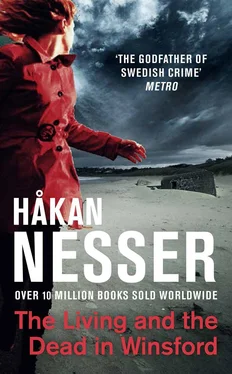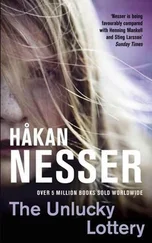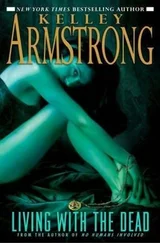Håkan Nesser - The Living and the Dead in Winsford
Здесь есть возможность читать онлайн «Håkan Nesser - The Living and the Dead in Winsford» весь текст электронной книги совершенно бесплатно (целиком полную версию без сокращений). В некоторых случаях можно слушать аудио, скачать через торрент в формате fb2 и присутствует краткое содержание. Год выпуска: 2013, Издательство: Mantle, Жанр: Криминальный детектив, на английском языке. Описание произведения, (предисловие) а так же отзывы посетителей доступны на портале библиотеки ЛибКат.
- Название:The Living and the Dead in Winsford
- Автор:
- Издательство:Mantle
- Жанр:
- Год:2013
- ISBN:нет данных
- Рейтинг книги:4 / 5. Голосов: 1
-
Избранное:Добавить в избранное
- Отзывы:
-
Ваша оценка:
- 80
- 1
- 2
- 3
- 4
- 5
The Living and the Dead in Winsford: краткое содержание, описание и аннотация
Предлагаем к чтению аннотацию, описание, краткое содержание или предисловие (зависит от того, что написал сам автор книги «The Living and the Dead in Winsford»). Если вы не нашли необходимую информацию о книге — напишите в комментариях, мы постараемся отыскать её.
The Living and the Dead in Winsford — читать онлайн бесплатно полную книгу (весь текст) целиком
Ниже представлен текст книги, разбитый по страницам. Система сохранения места последней прочитанной страницы, позволяет с удобством читать онлайн бесплатно книгу «The Living and the Dead in Winsford», без необходимости каждый раз заново искать на чём Вы остановились. Поставьте закладку, и сможете в любой момент перейти на страницу, на которой закончили чтение.
Интервал:
Закладка:
Very true.
During the twenty minutes I had spent at The Rest and Be Thankful Inn, twilight had thickened into darkness, and it had stopped raining for now. I gave Castor a special treat — dried liver: that’s his secret passion — and consulted the map. I drove out of the car park and set off along the A396 in the direction of Dulverton. After a few tortuous, winding miles I came to a road turning off to the right, with a sign saying: Winsford 1. This new road led down into a narrow valley, presumably following the course of the River Exe — which as I understood it gave its name to the whole moor — but the stream was no more than a vague suspicion of trickling movement through the car window. Or perhaps a premonition, a hint of a living being: it was not difficult to succumb to mysterious illusions in this unfamiliar, almost invisible landscape as the mist began to swallow it up; and when the first buildings on the edge of the village were caught in the beam of my headlights I felt a sort of atavistic relief. I drove past the village shop, and the local post office, then turned left and — in accordance with the instructions I had been given — parked in front of a war memorial commemorating the fallen in the First and Second World Wars. Together with Castor I crossed a simple wooden bridge over a fast-flowing stream, noted a church steeple outlined against the patchy blue sky that had suddenly been washed clean of mist, and started walking along a village street called Ash Lane. Not a soul in sight. Just past the church I knocked on a blue door in a low pommer stone house, and ten seconds later that door was opened by Mr Tawking.
‘Miss Anderson?’
That was the name I had given him. I don’t know why I had hit upon my mother’s maiden name — perhaps for the simple reason that I was hardly likely to forget it. Anderson with only one ‘s’, which is how they spell it in this country. By means of a simple hand gesture Mr Tawking indicated that I was welcome to step inside, and we each sat down in an armchair by a low, dark wooden table in front of an artificial gas fire. A teapot, two cups, a plate of biscuits, that was all. Apart from two keys on a ring lying on top of a sheet of paper, which I gathered was the rental contract. He served tea, stroked Castor and invited him to lie down in front of the warm fire. Castor did as he was bid, and it was obvious that Mr Tawking was used to dealing with dogs. But I could see no sign of one at the moment: Mr Tawking was old and hunched, certainly well over eighty — perhaps he had had a four-legged friend that died recently, and perhaps he had felt it was too late to acquire a new one. Dogs should not outlive their owners, that was a conclusion I had recently come round to.
‘Six months from yesterday,’ said Mr Tawking. ‘From the first of November until the end of April. So there we are — don’t blame me!’
He attempted to smile, but his muscles were not quite able to follow his intentions. Maybe it was a long time since he had anything to feel pleased about: there was an ingrained sense of melancholy enveloping both him and the room in which we were sitting. Maybe it was not just a dog that had left him, I thought, but a wife as well. Wives ought usually to outlive their husbands, but that is quite a different matter and not something I had any desire to think about in the present circumstances, certainly not. Instead I noted that the fitted carpet was dirty and worn in places; there were patches of damp on the gaudily patterned wallpaper, and for some strange reason a piece of red tape was stuck to the top right-hand corner of the television screen. I felt an urge to get out of here as quickly as possible. My own feelings of impending twilight needed no further encouragement, and after less than a quarter of an hour I had signed the contract, paid the agreed price for six months’ rent — £3,000 in cash (plus the £600 I had paid into his account two days ago) — and been given the keys. We had talked about nothing apart from the weather and the practical details.
‘You’ll find an instruction book on the draining board. It’s intended for summer visitors, of course, but if there’s anything else you want to know about just call in or give me a ring. My number is in that book. Be careful when you make a fire.’
‘Will my mobile phone work up there?’
‘That depends on which network you are with. You can always try from the mound on the other side of the road. You can usually get a signal there. The place where that woman is buried, and round about there. Elizabeth.’
We shook hands, he stroked Castor again, and we left him.
The mistress and her dog returned along Ash Lane to the monument and the car. It was becoming windy, gusts lashed and buffeted the larch trees and telephone wires, but the rain held back. The mist meant that visibility was thirty metres at most. There was still no sign of any living creature apart from us. Castor jumped onto his seat in the car, and I gave him another liver treat. We exchanged a few reassuring thoughts, and I did my best to erase the questions in his worried eyes. Then we set off and proceeded carefully along the other road through the village. Halse Lane.
After only fifty metres we passed the village pub. It’s called The Royal Oak Inn, has an impressively thick thatched roof, and faint beams of light shone out of its windows onto the road. Just past it, but on the other side of the road, with gloomy-looking rectangular windows, was Karslake House, a hotel boarded up for the winter.
Then both buildings and street lighting came to an end. The road became even narrower and was barely wide enough to accommodate a single vehicle: but during the seven or eight minutes it took us to reach Darne Lodge, through a series of convoluted and awkward bends, we didn’t meet a single car. Visibility was restricted by high, grassy and stony banks that had evidently been flanking the road for centuries — apart from the final section when the moor suddenly stretched out on all sides, temporarily illuminated by a full moon that succeeded in piercing the clouds and mists for a few seconds. All at once the landscape looked ethereal, like an old painting — Gainsborough or Constable perhaps? Or why not Caspar David Friedrich? Friedrich has always been Martin’s favourite artist: a reproduction of Monk by the Sea was hanging on the wall of his office when we first met.
I was struck by an ambivalent feeling of fear and relief when I got out of the car to open the gate. Or perhaps I had been flirting with this same unholy alliance as Friedrich, darkness and light, ever since what happened on that beach just outside Miȩdzyzdroje.
Miȩdzyzdroje — I still can’t pronounce it properly, but the spelling is correct (apart from the strange accent under the first ‘e’ that I don’t know how to produce): I’ve checked it. Eleven days ago now. A very difficult period of time if ever there was one, but despite everything, the nerve-racking, choking feelings have become slightly less acute for every morning that has passed, and every decision made — at least, I like to think that has been the case.
I have made up my mind to continue thinking that.
And if only I could switch on the electricity, get a fire started and sink a glass or two of port, I would be faced with a sea of tranquillity. Six months of winter and spring on the moor. With no company apart from Castor, my own ageing body and my misguided soul. Each day like every other, every hour impossible to distinguish from the preceding or the subsequent one. . Ah well, in so far as it was possible to begin to envisage the coming six months, that is more or less how things looked. A hermit’s life of redemption and reflection and God only knows what — but both Castor and I were well aware that we should spare no thought for the morrow, and an hour later, when he was on his sheepskin and I was in a rocking chair in front of the somewhat hesitantly crackling fire, we simply fell asleep, one after the other.
Читать дальшеИнтервал:
Закладка:
Похожие книги на «The Living and the Dead in Winsford»
Представляем Вашему вниманию похожие книги на «The Living and the Dead in Winsford» списком для выбора. Мы отобрали схожую по названию и смыслу литературу в надежде предоставить читателям больше вариантов отыскать новые, интересные, ещё непрочитанные произведения.
Обсуждение, отзывы о книге «The Living and the Dead in Winsford» и просто собственные мнения читателей. Оставьте ваши комментарии, напишите, что Вы думаете о произведении, его смысле или главных героях. Укажите что конкретно понравилось, а что нет, и почему Вы так считаете.












